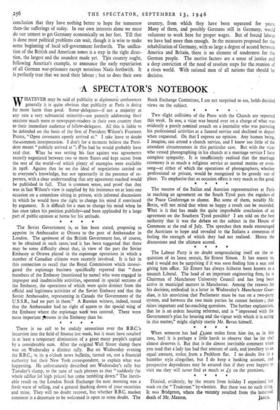A SPECTATOR'S NOTEBOOK .
WHATEVER may be said of publicity at diplomatic conferences generally it is quite obvious that publicity at Paris is doing far more harm than good. Some4delegates—if not a majority at any rate a very substantial minority—are patently addressing their orations much more to newspaper-readers in their own country than to their immediate audience of fellow-delegates. All this is liable to be defended on the basis of the first of President Wilson's Fourteen Points, " Open covenants openly arrived at." I take leave to doubt the•common interpretation. I don't for a‘ moment believe the Presi- dent meant " publicly arrived at "; &lie had he would probably have said that. What he was setting his face against was agreements secretly negotiated between_two or more States and kept secret from the rest of the world—of which plenty of examples were available in 1918. Against that he set the ideal of negotiations carried on to everyone's knowledge, but not ngcessarily in the presence of re- porters, with a dear understanding that any agreement reached would be published in full. That is common sense, and proof that that was in fact Wilson's view is supplied by his insistence on at least one occasion on a committee sitting in private, with informal discussions in which he would have the right to change his mind if convinced by argument. It is difficult for a man to change his mind when he has once taken his position publicly- andbeen applauded by a large part of public opinion at home for his attitude.
* * * *


























 Previous page
Previous page